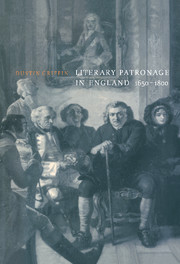Book contents
- Frontmatter
- Contents
- Acknowledgments
- 1 Introduction
- 2 The cultural economics of literary patronage
- 3 The politics of patronage
- 4 John Dryden
- 5 Jonathan Swift
- 6 Alexander Pope
- 7 Edward Young and Richard Savage
- 8 Mary Leapor and Charlotte Lennox
- 9 Samuel Johnson
- 10 The persistence of patronage
- 11 Conclusion
- Bibliography
- Index
1 - Introduction
Published online by Cambridge University Press: 22 August 2009
- Frontmatter
- Contents
- Acknowledgments
- 1 Introduction
- 2 The cultural economics of literary patronage
- 3 The politics of patronage
- 4 John Dryden
- 5 Jonathan Swift
- 6 Alexander Pope
- 7 Edward Young and Richard Savage
- 8 Mary Leapor and Charlotte Lennox
- 9 Samuel Johnson
- 10 The persistence of patronage
- 11 Conclusion
- Bibliography
- Index
Summary
My goal in this study of literary patronage is to shed new light on literary texts and to understand how those texts functioned within the literary, political, and economic culture in which they were written. Underlying my argument is the assumption that to consider literary texts and writers apart from the complex system of sponsorship, financing, production, and distribution, is arbitrarily and myopically to abstract literature from its living cultural context, and to misconceive its full meaning for its original audiences.
Literary patronage has long been a familiar – if neglected – topic in the literary history of early modern England, though it has not been systematically examined since the two books published by A. S. Collins in 1929, Authorship in the Days of Johnson, and The Profession of Letters, or even since the older book (which had served as Collins' guide), Alexandre Beljame's Men of Letters and the English Public in the Eighteenth Century, first published in 1881. But in my view, neither Collins nor Beljame, despite their knowledge of the period, took sufficient account of the historical context, and neither was sufficiently alert to the nuances in the voices of writers they celebrated. Indeed, their very celebration of their literary heroes as independent “men of letters” limited their ability to understand the system they were describing. For to both Collins and Beljame, and indeed to most writers on the subject, the patronage system was by definition oppressive and demeaning.
- Type
- Chapter
- Information
- Literary Patronage in England, 1650–1800 , pp. 1 - 12Publisher: Cambridge University PressPrint publication year: 1996

